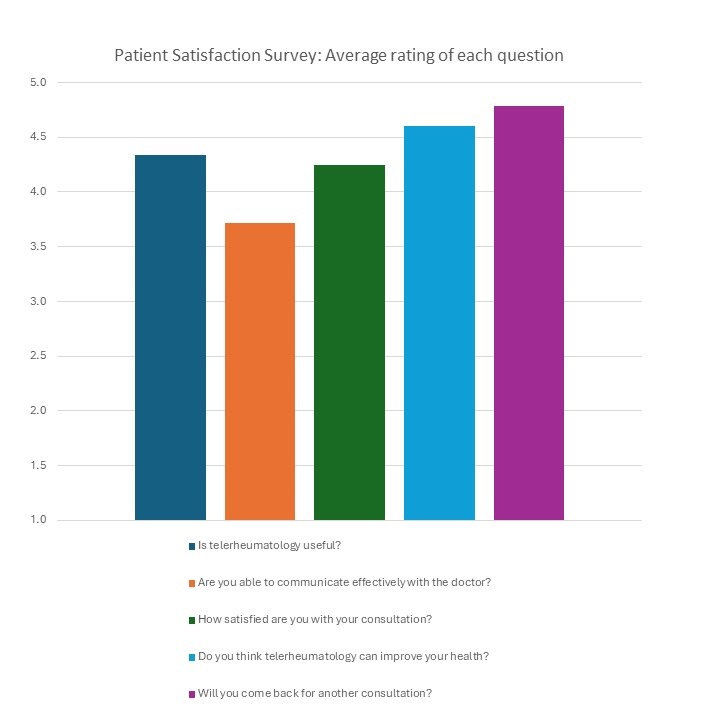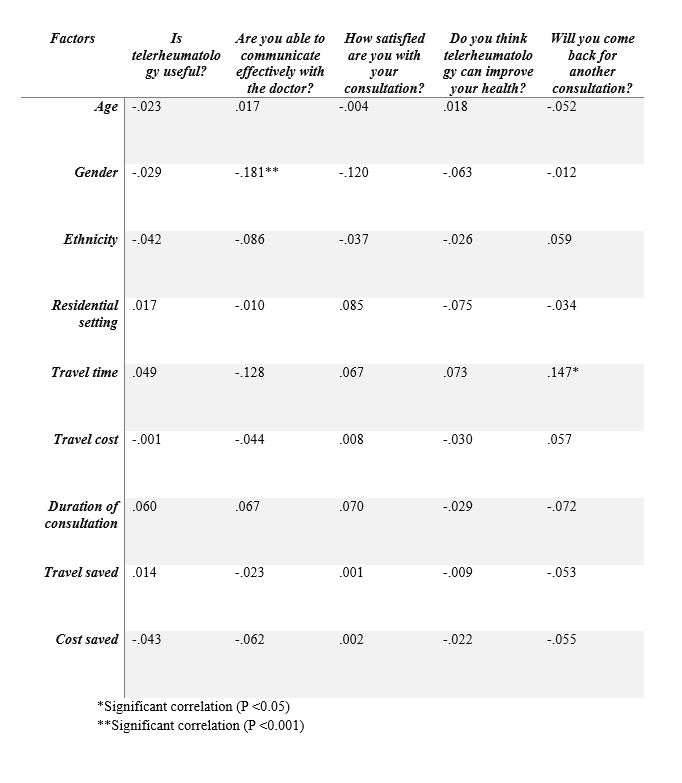Session Information
Session Type: Poster Session C
Session Time: 10:30AM-12:30PM
Background/Purpose: Telerheumatology has emerged as a promising tool for improving access to rheumatology services globally. Health delivery in remote rural areas is particularly challenging. Telerheumatology can bridge distances and reduce costs, thereby improving healthcare delivery in remote and underserved areas. We assessed patients’ satisfaction with a rural telerheumatology program in the Gilgit-Baltistan region of Pakistan, an area known for its accessibility challenges.
Methods: The participants of a rural telerheumatology program were invited to take part in a patient satisfaction survey. The survey was based on demographics, a patient satisfaction questionnaire, and utilization metrics. Patient’s satisfaction was measured by a 5-item questionnaire measuring perceived usefulness, ability to communicate, satisfaction with consultation, perception about health improvement, and intention to return for another consultation. Intergroup comparisons were made using the independent sample’s t-test, and bivariate correlations were done using Pearson’s and Point-Biserial correlation. The statistical significance was set at P< 0.05. Statistical analysis was performed using SPSS V 27.
Results: Of 218 respondents, 125 (57.3%) were female, and 195 (89.4%) were Balti in ethnicity. The overwhelming majority (199/218, 91.3%) of respondents resided in rural settings. The average respondent age was 47 ± 15 years. The average consultation duration was 16 ± 4 minutes. Average satisfaction ratings were 4.3/5 for perceived usefulness, 3.7/5 for ability to communicate, 4.2/5 for satisfaction with consultation, 4.6/5 for perception of potential health improvement, and 4.8/5 for intention to return (Figure 1).
Significant differences were observed in average ratings by males and females in the ability to communicate effectively (P< 0.05). We also observed a negative correlation between gender and the ability to communicate effectively (r=0.181, P< 0.05). A positive correlation was observed between the time taken to reach the teleunit and the intention to return for another consultation (r=.147, P< 0.05) (Table 1).
Conclusion: The Patient’s satisfaction survey found high overall ratings for all items, indicating a positive perception of the rural telerheumatology program. Gender-based differences in the ability to communicate effectively highlight areas for potential improvement.
To cite this abstract in AMA style:
Khursheed T, Raza U, Rasheed U, Aziz W. Patient’s Satisfaction with a Telerheumatology Program in a Remote Rural Area of Northern Pakistan [abstract]. Arthritis Rheumatol. 2024; 76 (suppl 9). https://acrabstracts.org/abstract/patients-satisfaction-with-a-telerheumatology-program-in-a-remote-rural-area-of-northern-pakistan/. Accessed .« Back to ACR Convergence 2024
ACR Meeting Abstracts - https://acrabstracts.org/abstract/patients-satisfaction-with-a-telerheumatology-program-in-a-remote-rural-area-of-northern-pakistan/


